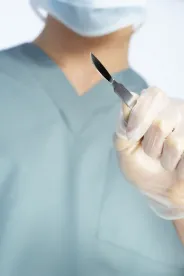A pediatric surgeon specializes in the treatment of birth defects and childhood medical conditions through surgical procedures and ongoing care. Surgical errors occurring during these procedures may have a profound impact on the child’s physical and mental development and could severely alter his or her quality of living.
Procedures Performed by Pediatric Surgeons
In order to become a pediatric surgeon, doctors must be able to perform numerous types of procedures and treat a wide range of medical conditions. The conditions they may treat through surgery include the following.
-
Appendectomy— when the appendix becomes infected or it is painful due to inflammation, it may need to be removed. Emergency appendectomies may be performed in the event that the appendix ruptures.
-
Biliary atresia— this surgical procedure corrects a congenital birth defect where the bile produced by the liver cannot be emptied properly. The bile ducts are rerouted during this operation so that the liver can begin to drain as it needs to.
-
Various cancer treatments— there are a number of childhood cancers that a pediatric surgeon may be required to treat, which can include cancers of the liver, abdomen, kidneys or pancreas. The surgeon may operate to implant a portocath or to remove a cancerous tumor prior to radiation or chemotherapy.
-
Congenital defects— there are numerous congenital defects that may impact the ability of a child to thrive. Malformed lungs, kidneys and hearts are the most common defects that require surgical care. The surgeon may need to reconstruct the impacted organ and then prescribe medicine to help with the ongoing treatment of an associated condition.
-
Gallbladder surgery— the gallbladder may become infected due to a virus, formation of a stone or another medical condition. If other treatment methods fail, surgery to remove the gallbladder may be required.
-
Gastroschisis— this defect causes the intestines and stomach to fall from the body through a hole in the infant’s abdomen. A pediatric surgeon will perform surgery immediately following birth to place the organs back into place and to seal the opening.
-
Bowed chest— this occurs when a child’s breast bone and ribs grow disproportionately and may require surgical intervention if braces and other forms of treatment do not correct the issue.
-
Reproductive defects— if a child has suffered from a congenital defect of the genitals, surgical intervention may be required to remove tumors and cysts or to correct dysfunction of the organs.
-
Removal of the spleen— it is possible for a child to need to undergo a splenectomy if suffering from certain disorders of the blood or if he or she has suffered a traumatic injury.
-
Bariatric surgery— a treatment for childhood obesity where a balloon is inserted into the esophagus to narrow the opening and reduce appetite.
-
Removal of diseased intestines— some birth defects result in the inflammation of the bowel followed by tissue death. The only way the condition can be treated after the bowel has been seriously damaged is through surgery.
-
Hernia surgery— if a child is born with a hole in the groin that does not close on its own, the surgeon may need to perform a surgical procedure in order to prevent the intestines from falling through this opening.
-
GERD treatment— also referred to as acid reflux, GERD often occurs when stomach acid is able to flow back up the esophagus. It can be corrected by tightening the opening between the esophagus and the stomach so that the acid is contained.
-
Abnormal pathways— when a child’s trachea or esophagus is malformed, it can result in respiratory or digestive problems. It may even threaten the child’s life and could require surgical intervention to reconstruct the airway or the path of the esophagus to the stomach.
-
Imperforate anus— if a child is born without an opening in the anus, or when the opening is in the wrong location, a surgical procedure is required to allow waste to be eliminated through the bowel.
The Impact of Surgical Errors on Child Health
A medical error during childhood can have an impact on how the child grows throughout his or her formative years and may set him or her back both physically and mentally when compared with his or her peers. Certain defects or complications may also affect the child’s social development by making him or her more prone to ridicule and ostracism. If your child has suffered from a surgical error, you may be able to recover compensation so that you can provide the care and comfort he or she needs to lead a happy and productive life.




 />i
/>i

